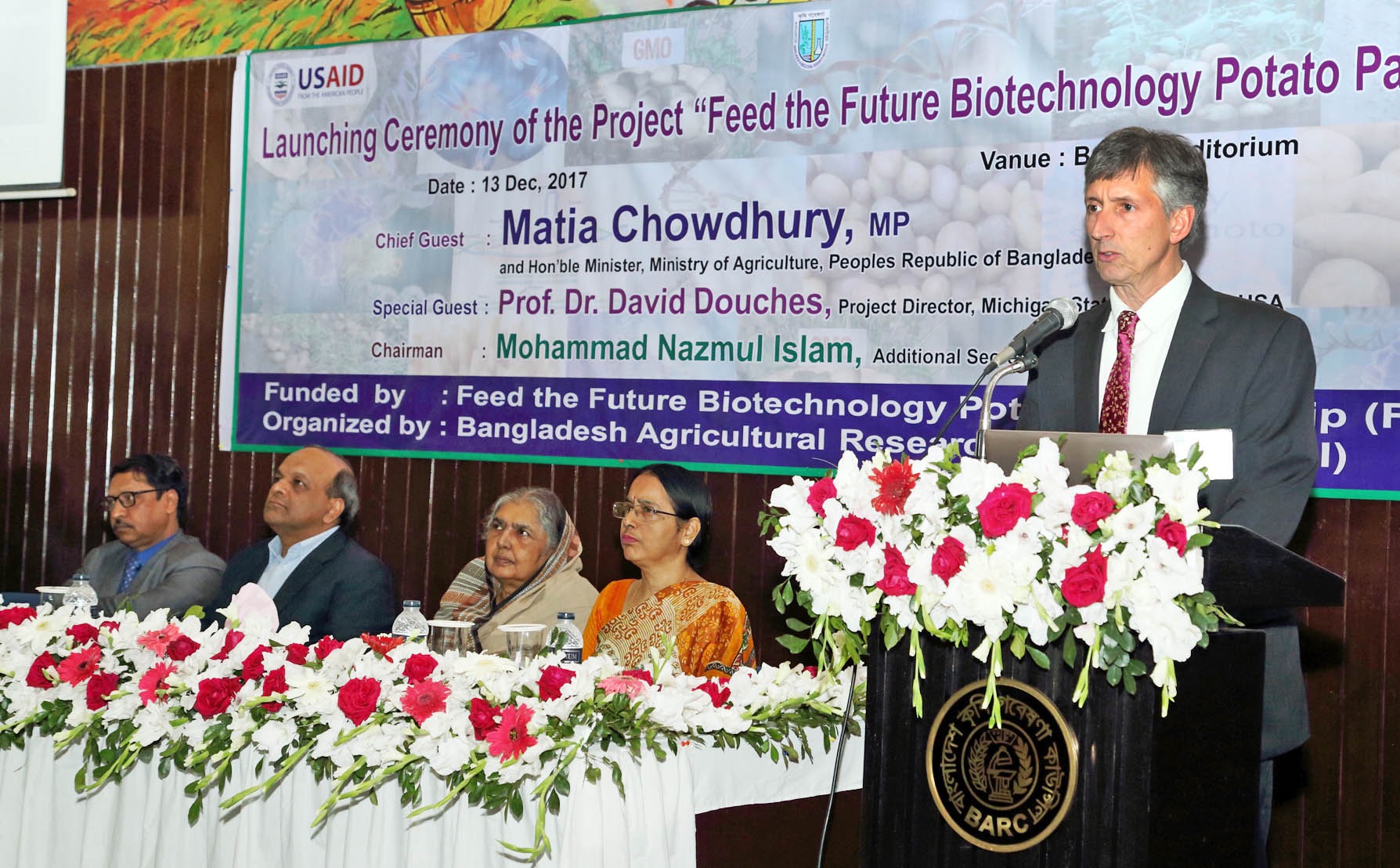MSU researcher reflects on first Earth Day celebration; “It inspired me to dedicate my career to potato research”
MSU potato breeder Dave Douches looks back to the first Earth Day celebration fifty years ago and reflects on how events that day inspired his career in horticulture.

No one could predict that a simple event during an average day in the life of a fifth-grade boy from New Jersey would inspire a career long commitment to horticulture.
The day was April 22, 1970.
The event was planting forsythia bushes with fellow classmates at A.P. Morris Elementary school in Hillside, NJ to celebrate the inaugural Earth Day. A day to acknowledge our earth and focus on ways to protect it.
The fifth-grade boy was 11-year old Dave Douches.
Douches, who 50 years later has established himself as a pioneer potato breeder as Director of Michigan State University’s Potato Breeding and Genetics Program, says those early Earth Day events awoke a passion for plants.
“I was 11 and thought, hey this Earth Day stuff is kinda cool. Just that initial event of digging in the dirt and planting those bushes in the schoolyard imprinted with me,” shares Dave.
That summer Dave started a garden in the backyard of the two-story home he shared with his parents and two sisters. His interest in plants grew and he went on to study plant breeding at Rutgers University. He was introduced to potato breeding and genetics at North Carolina State University during his graduate studies. He decided to continue his studies in potato while at UC Davis where he earned his Ph.D. At UC Davis he began to view the potato with a different lens.
Dave explains, “it kind of triggered me to say, ‘Well, there’s a career opportunity to be a potato breeder, and study the genetics of the potato’ and so, I did.”
“Potatoes are such an important food crop globally. Many people don’t realize the nutritional value of potatoes; a potato has more potassium than a banana. They contain no fat, sodium or cholesterol. They come in all shapes, sizes, textures and colors. They’re incredibly versatile in recipes, what’s not to love about potatoes?” Dave quips.
Potatoes rank as the third most important global food crop. They produce more nutritious food, more quickly on less land and in harsher climates than any other major crop. Dave believes the potato may be one answer to feeding our growing world. That’s why his research is focused on using multiple tools to develop the best possible improved and new varieties.
Douches also believes biotechnology can be one tool scientist can use to combat potatoes worst natural enemies such as late blight disease.
“Late blight is a particularly damaging disease that costs between $5-6 billion dollars worldwide with annual crop loses ranging from 30-70%,” says Dave. “Biotechnology is safe. There are decades of research to back that up. It has application to make an especially big impact in developing worlds who cannot feed their people. It allows us to advance and enhance crops at a pace that traditional breeding just can’t match. Plus, it’s good for our earth.”
Dave is currently heading up a USAID funded project at MSU to bring a late blight resistant potato to small holder farmers in Bangladesh and Indonesia. The project, Feed the Future Biotechnology Partnership has developed a potato that is naturally resistant to late blight through the insertion of a three gene ‘stack’ of naturally resistant genes identified from wild potato species.

Management of late blight disease requires aggressive chemical fungicide spraying. They are expensive and can be harmful when the farmers apply them without protective equipment.
“These potatoes should really benefit poor farmers in many ways. Their input costs will be dramatically reduced with the virtual elimination of fungicides but the bigger benefit is to human and environmental health. I’ve seen photos with farmers in these countries spraying in bare feet flip flops, no masks or protective clothing. It can be dangerous for them, their families. Less spray equals less exposure and environmental residue,” says Dave.
Project private sector partner, Simplot Plant Sciences developed the three resistant gene stack and transformed it into two farmer preferred varieties; Granola for the Indonesian farmers and Diamant for the Bangladeshis.
“Simplot has a lot of experience testing, developing and commercializing enhanced trait potatoes. Their Innate potatoes were developed using genes only from wild and cultivated Russet potatoes that are more bruise resistant and produce less asparagine that other potato varieties,” says Douches. “Simplot has been an amazing partner to work with, they are a family company and share my vision of humanitarian service.”
Be it working to solve food security issues around the globe or around the block, Dave’s research has impacted many.
For Dave, Earth Day will always be a special day. It takes him back to that first celebration fifty years ago, back in that elementary schoolyard planting those bushes for all to enjoy.
“We’re all in this together,” says Dave. “We have one earth to share and it’s everyone’s responsibility to take care it.”



 Print
Print Email
Email




